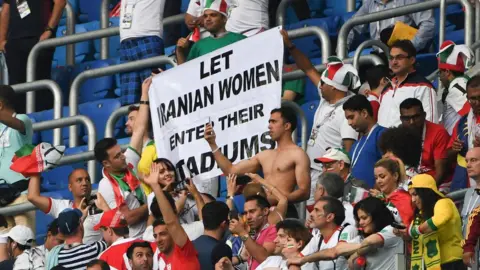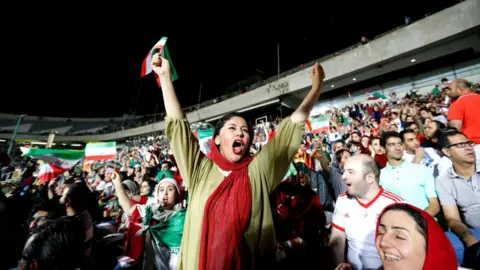Iran's 'blue girl' dies after setting herself on fire
 Getty Images
Getty ImagesAn Iranian female football fan who set herself on fire a week ago has died.
The woman set herself alight in Tehran after her trial, for attempting to enter a football stadium disguised as a man, was postponed.
The authorities in Iran regularly stop women from entering stadiums.
Her story has been followed closely by Iranians around the world who used the hashtag "blue girl" - a reference to the colours of her favourite team, Esteqlal of Tehran.
The woman, named as Sahar Khodayari, was arrested in March when she tried to enter a football stadium.
After being jailed for three days she was released on bail and waited six months for her court case.
But when she appeared at court she found out it had been postponed because the judge had a family emergency.
She later returned to court to pick up her mobile phone and it is widely reported that she is thought to have overheard someone saying that if she were convicted she could get six months to two years in prison.
She then set herself alight in front of the court house and later died in hospital.
Women in Iran have been stopped from going to stadiums to watch men’s sporting events since 1981. This was temporarily lifted last year to allow women to watch the World Cup being streamed at a stadium in Tehran.
 Getty Images
Getty ImagesWhile the sporting ban is not written into law, it is "ruthlessly enforced", says Human Rights Watch.
Football's governing body Fifa set a deadline of 31 August for Iran to allow women into stadiums - something the country has not yet guaranteed.
"We are aware of that tragedy and deeply regret it," a Fifa statement said. "Fifa convey our condolences to the family and friends of Sahar and reiterate our calls on the Iranian authorities to ensure the freedom and safety of any women engaged in this legitimate fight to end the stadium ban for women in Iran."
Calling the case "heart-breaking", Philip Luther from Amnesty International said her death showed the impact of Iran's "appalling contempt for women's rights".
"Her death must not be in vain. It must spur change in Iran if further tragedies are to be avoided in the future."
The woman's self-immolation has led to a lot of debate in Iran.
Masoud Shojaei, the captain of the Iran men's football team, said on Instagram that the ban is "rooted in outdated and cringe-worthy thoughts that will not be understood by future generations".
Earlier this month, Iranians started campaigning online for world sporting organisations to ban the country from competitions to stop what they see as state interference in sports.
